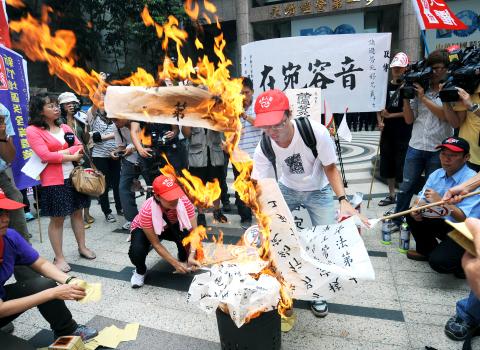More than 100 workers and people from labor-related groups held a rally in front of the Council of Labor Affairs (CLA) on the eve of Father’s Day yesterday morning to protest against what they say are inordinately long working hours.
Holding handmade signs with messages such as “I work such long hours that I can’t see my children when they’re awake” and “I’m so tired from work that I don’t have the energy to raise children,” protesters shouted: “Abolish article 84-1” and “Against working inordinately long hours.”
The protesters said an increasing number of deaths from overwork were occurring in Taiwan because of the amended Article 84-1 of the Labor Standards Law (勞工基準法).

Photo: Lo Pei-der, Taipei Times
Article 84-1 states that the working conditions for certain jobs can be established through labor and capital negotiations, which excludes them from other articles that regulate maximum working hours, overtime hours and minimum holidays.
Most of the workers gathered yesterday were from the security sector and the electronics, electrical and information technology industries in Hsinchu.
The Hsinchu area’s Security Service Industry Trade Union chairperson Lo Chen-kun (羅振昆) said several employers did not hire enough security personnel, so much so that two security workers had to work 12-hour shifts instead of three workers doing eight-hour shifts.
Lo said that although the government had suggested that the maximum monthly working hours for the security sector be set at between 240 and 288 hours, such employees continued to work an average of more than 312 hours a month without overtime pay and with very few rest days.
A worker in his 40s surnamed Lo (羅), who has worked in private security for about a decade, said he worked an average of 12 to 15 hours per day, which meant he could only see his children once a week.
On one occasion, he worked 372 hours in one month, he said.
“Tomorrow is Father’s Day, but I won’t be happy at all,” he said. “Do you think I have any quality of life?”
Trade Union of the Electrical, Electronic and Information Technology Industries chairperson Liang Jui-fang (梁瑞芳) said the employers clearly stated in the labor contract that they applied what is known as the job responsibility system, under which no overtime pay is provided even if employees work inordinately long hours.
Many engineers died on their way to work or at home because of long working hours and excess stress, Liang said.
The protesters prayed for workers who have died from overwork and burned “ghost money” in front of the council’s headquarters. They then presented a pig liver, symbolizing a worker’s ailing liver from overwork, to CLA Department of Labor Standards section chief Huang Wei-shen (黃維深), along with their petition to demand better-protected working conditions.
The protesters shouted their demands as they paraded through the streets of Taipei.
In response, the council said in a press release that it would enforce stricter inspections on labor conditions.
The council also launched a special project, in collaboration with local governments, to conduct a nationwide large-scale inspection of about 10,000 cases, it said.
“Working conditions where employers are unwilling to pay overtime and where workers work inordinately long working hours will be prioritized by the Council when carrying out inspections, and violations can lead to fines of up to NT$30,000,” Huang said.

An essay competition jointly organized by a local writing society and a publisher affiliated with the Chinese Communist Party (CCP) might have contravened the Act Governing Relations Between the People of the Taiwan Area and the Mainland Area (臺灣地區與大陸地區人民關係條例), the Mainland Affairs Council (MAC) said on Thursday. “In this case, the partner organization is clearly an agency under the CCP’s Fujian Provincial Committee,” MAC Deputy Minister and spokesperson Liang Wen-chieh (梁文傑) said at a news briefing in Taipei. “It also involves bringing Taiwanese students to China with all-expenses-paid arrangements to attend award ceremonies and camps,” Liang said. Those two “characteristics” are typically sufficient

A magnitude 5.9 earthquake that struck about 33km off the coast of Hualien City was the "main shock" in a series of quakes in the area, with aftershocks expected over the next three days, the Central Weather Administration (CWA) said yesterday. Prior to the magnitude 5.9 quake shaking most of Taiwan at 6:53pm yesterday, six other earthquakes stronger than a magnitude of 4, starting with a magnitude 5.5 quake at 6:09pm, occurred in the area. CWA Seismological Center Director Wu Chien-fu (吳健富) confirmed that the quakes were all part of the same series and that the magnitude 5.5 temblor was

The brilliant blue waters, thick foliage and bucolic atmosphere on this seemingly idyllic archipelago deep in the Pacific Ocean belie the key role it now plays in a titanic geopolitical struggle. Palau is again on the front line as China, and the US and its allies prepare their forces in an intensifying contest for control over the Asia-Pacific region. The democratic nation of just 17,000 people hosts US-controlled airstrips and soon-to-be-completed radar installations that the US military describes as “critical” to monitoring vast swathes of water and airspace. It is also a key piece of the second island chain, a string of

The Central Weather Administration has issued a heat alert for southeastern Taiwan, warning of temperatures as high as 36°C today, while alerting some coastal areas of strong winds later in the day. Kaohsiung’s Neimen District (內門) and Pingtung County’s Neipu Township (內埔) are under an orange heat alert, which warns of temperatures as high as 36°C for three consecutive days, the CWA said, citing southwest winds. The heat would also extend to Tainan’s Nansi (楠西) and Yujing (玉井) districts, as well as Pingtung’s Gaoshu (高樹), Yanpu (鹽埔) and Majia (瑪家) townships, it said, forecasting highs of up to 36°C in those areas